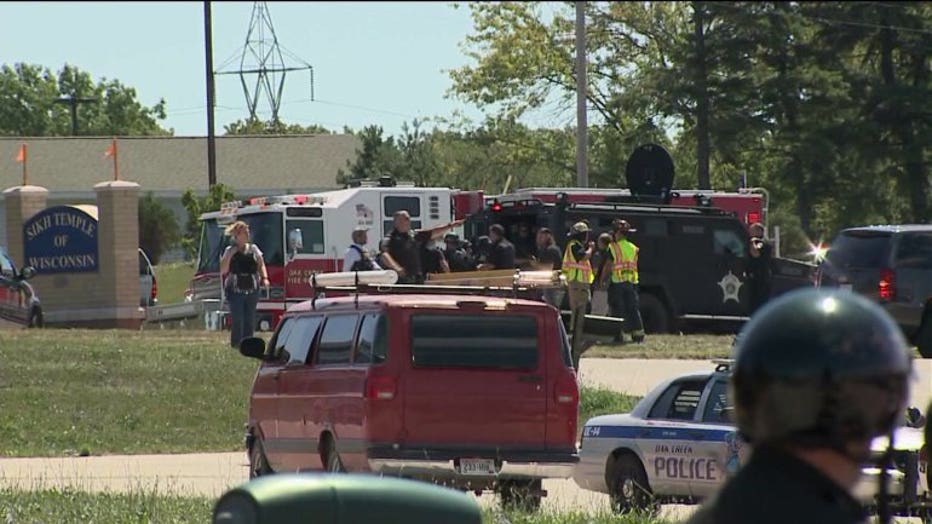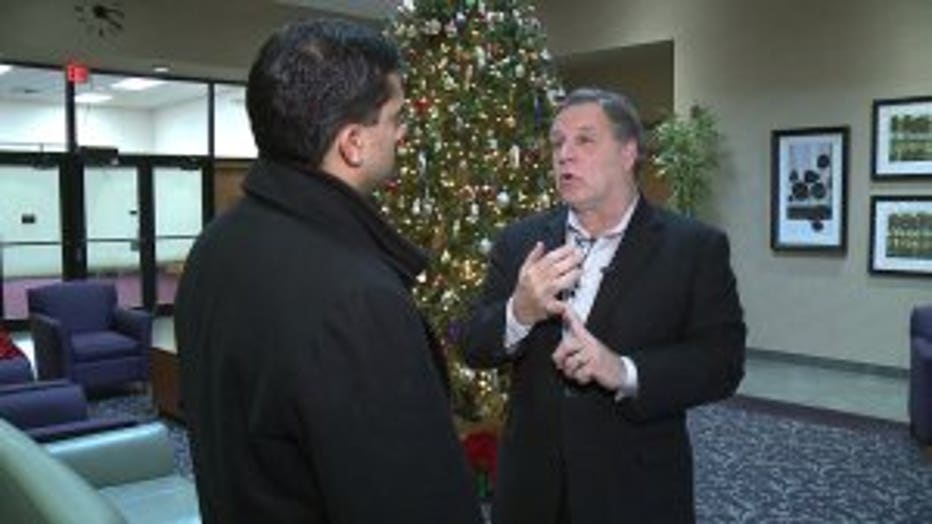Oak Creek Mayor reacts strongly to San Bernardino shooting: "It's personal to me"
OAK CREEK -- The mayor of Oak Creek is well aware of the pain caused by mass shootings and now he's speaking up. In 2012, a gunman killed six people in the Sikh Temple of Wisconsin. Following the shooting in San Bernardino, Steve Scaffidi says we need to have an honest talk about gun violence.

Mayor Steve Scaffidi
"I've lived it. I've experienced every aspect and every phase of that immediate event and everything that's happened since. It's personal to me," said Oak Creek Mayor Steve Scaffidi.
Scaffidi says the events of August 5th, 2012 ensure he will never be silent on the subject of mass shootings.
"Instead of getting entrenched in our two camps about either you're all guns or no guns, there's got to be some nuance and subtlety to these arguments and these conversations," said Scaffidi.
He says whether the shooting was prompted by radical Islam, workplace anger, or both -- the slaying of 14 people highlights a public need to keep guns from violent people.

San Bernardino shooting
"I'm absolute on that; that has to be the case in this country. We can't afford to have people that shouldn't have guns running around with weapons, I'm sorry," Scaffidi said.
Scaffidi's open letter has a harsh tone at times, saying "we use silly arguments and fall back into entrenched, absolutist positions that may make us feel better as part of a defense of our own personal agendas or political tastes,'" said Scaffidi.
Scaffidi says he's gotten a large response, some of it positive and some of it not.

Mayor Steve Scaffidi
"People don't like it, they can come to me and tell me they don't like it -- and they have," Scaffidi said.
Critics say the letter points to a problem but fails to provide any solutions.
Scaffidi says, at this point, researching gun violence should be a top priority.
"How does it happen, what are the circumstances leading up to it, are there things we can put in place that are checkpoints that say, 'this might lead to this,' and then let's use law enforcement," said Scaffidi.
Scaffidi says he's absolutely against the idea of government taking guns from law-abiding owners. He adds he is also certain that more guns would not lead to fewer mass shootings. He says if that were the answer, the problem would already be solved, given the amount of guns already owned in the U.S.
Below is Mayor Scaffidi's editorial:
“I’ve had enough.
Wednesday afternoon I was greeted by the news from San Bernardino, Calif., that at least 14 people were killed in another mass shooting incident, this time at a public facility.
I’m tormented by the stark realization that as a nation that prides itself as the voice of justice and compassion to the rest of the world, we can’t go through a week’s news cycle without hearing about another mass shooting and innocent people losing their lives, often in the most violent and brutal manner.
As a mayor who dealt with this issue firsthand at the Sikh Temple of Wisconsin shooting on Aug. 5, 2012, I’m weary of getting calls from news media asking me to comment on the most current mass shooting incident, especially when they ask me the question: What can we do about it? Controlling individual behavior is difficult, if not impossible, and trying to guess — in advance — what might motivate someone to commit an act of hate and violence will always be a challenge.
But in sharing this collective national shock whenever this happens, I would argue that we’re witnessing a fundamental and profound failure of our duty to protect our citizens from violence in any way possible, and we’ve turned over the debate to politicians, bloggers and lobbyists, all who hide behind tired clichés and fundamentally dishonest reasons why we can’t do anything about it.
The U.S. Constitution is a powerful and wise document, but with the rights it endows come responsibility, and I would argue that in the case of gun ownership, which is a right guaranteed by the Second Amendment, we’ve let that right define the culture and environment in which we live to a degree that it has taken over our consciousness and made our citizens feel less safe.
As an elected official, I feel the burden of the question every time a mass shooting takes place. What should I be doing? What can I do to lessen the likelihood that it will happen again? Why don’t we as a country take actions to reduce violence?
The answer, of course, is we could, but we don’t. We use silly arguments and fall back into entrenched, absolutist positions that may make us feel better as part of a defense of our own personal agendas or political tastes. We bury our head in nonstop television coverage that progresses from eyewitness accounts, to hastily-arranged news conferences to medical trauma centers, but stops short of moving forward on any legislation, policy or social changes that could actually make a difference.
I am a gun owner. But I have to believe that one of the popular responses to mass shootings — arm everyone and encourage individual and aggressive action against a mass shooter — is at best naive, and at worst, dangerous. Law enforcement professionals are highly trained and understand through direct experience that carrying a gun is a powerful responsibility and doesn’t guarantee that a shooter will be stopped.
The shooting at the Sikh Temple was a clear example of that, with one of our most experienced officers coming within an inch of losing his life. Expecting citizens to prevent or slow down perpetrators of violence seems logical, and in some cases might actually be possible, but it could result in the gun owner losing his or her life when mistaken for the shooter. As a country, we’ve lived through the “wild west” mentality of frontier justice. It didn’t work. It only made the weakest members of our society less safe.
And it won’t work now.
What can we do?
Why not start with researching and funding programs that have been proven to reduce violence? We live in a country of tremendous resources and brilliant minds who tackle difficult and complex problems every day. Why would we not care as much about this epidemic of violence as we do about all the other ways people die every day?
Steve”

